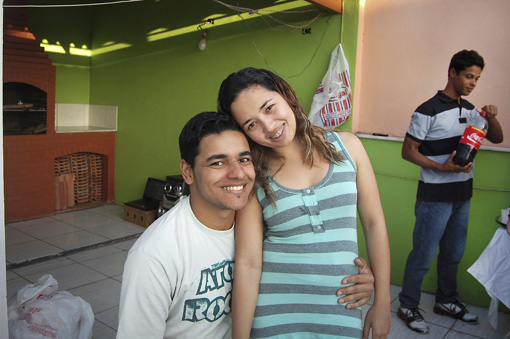On a breezy Saturday morning in the Rio de Janeiro neighborhood of Gardênia Azul, the women in the dos Santos family rise early for a long day of baking cakes. They have a good reason to be industrious: the wedding of Luis Miller dos Santos, 24, and his fiancé, Mayara Azevedo, 23, is barely two months away.
Luis’ mother’s 10-year-old family cake-baking business brings in hundreds of extra reais a week for her family. A four-tiered wedding cake can go for as much as 450 reais ($222), and a birthday cake goes for about 80 reais ($39). She sprinkles the dry cakes with Guaraná soda, a “secret ingredient” that makes them neighborhood favorites and a source of family pride.
Thanks to his mother’s entrepreneurship, Luis will be assured a better future as he and Mayara start their married lives together. Luis’ mother left her home in the state of Minas Gerais during Brazil’s “great migration,” which brought thousands of Brazilians seeking opportunity to the economic hubs of Rio de Janeiro and São Paulo. Her husband arrived from Bahia. Both came from large families of 10 siblings.
“My parents were both workers. With difficulty, they were able to have all the things they need in a home, like food. But there wasn’t enough to spend on leisure or to plan to buy a home or cars,” says Luis. “They worked with their hands.”
Luis’ parents raised him and a younger sister in Gardênia Azul, which is located in Rio de Janeiro’s Zona Oeste, or western zone, over an hour from the city’s major tourist attractions. Luis does not refer to his community—where homes are legally constructed and residents pay taxes—as a favela. Still, like many favelas, the neighborhood continues to be threatened by mafia-type milicias who extort fees in exchange for “protection” and “tax” residents for basic services, like gas tank deliveries. Nonetheless, the dos Santos family has worked hard to make a home for themselves in Gardênia Azul, and Luis plans to stay.
Unlike their migrant parents, Luis and Mayara are part of Brazil’s Internet generation. The couple met in their church youth group, but their romance blossomed when they started chatting by instant messenger after Mayara returned to her home state of Espírito Santo. Luis, who learned English as a child and is an avid fan of foreign TV, earned a scholarship to study at a prestigious private university. After a year as a translator in a business specializing in international legal documents, he was promoted to proofreader, bringing in 2,100 reais ($1,040) a month.
Before moving to Rio to prepare for her wedding, Mayara left her job as an assistant manager in a furniture store, where she earned 1,500 reais ($742) a month. She now works as a secretary for a physical therapist who specializes in treating martial arts athletes and earns about 1,000 reais ($495) a month.
While the couple’s salaries locate them well above Brazil’s minimum wage of 622 reais ($306) a month, Luis and Mayara will still struggle to keep pace with the rising cost of living in Brazil once they are married and on their own. The couple’s goal in their first year of marriage will simply be to get their feet solidly planted, Luis says—and that will mean balancing both living costs and future career plans.
A two-bedroom apartment in or near Gardênia Azul will cost them around $1,100 reais a month (about $545, and nearly double Brazil’s monthly minimum wage). In addition, Luis needs to take a pricey driver’s education course before he can get his license and a car. Mayara is already thinking of how she can save enough to pay for college entrance exam preperation courses so she can study management within the next five years.
There is one expense the couple won’t have to worry about. Like many Brazilians of their generation, Luis and Mayara say that they are uninterested in having children. Brazil’s latest census shows that the country’s fertility rate has fallen from 5.8 children per woman in 1970 to 2.1. It’s one of the steepest declines in fertility globally.
Instead, Luis and Mayara dream of traveling—something they have yet to do outside Brazil. For their honeymoon, Mayara wants to go to Gramado, in Brazil’s southernmost state of Rio Grande do Sul. “It’s a place that, let’s say, is more European. It’s colder and has tourist attractions,” she says.
Luis and Mayara are paying $880 reais ($345) for 100 elegant black-and-white invitations with custom inserts, the majority of which they’ll deliver on foot around Gardênia Azul—far less than the 16,000 reais ($7,883) spent for a modest but higher-end wedding. The cost of the reception and dinner will be split between Mayara, her mother, and Luis’ mother, while Luis is responsible for the clothing. The wedding ceremony itself, which will be held in Luis and Mayara’s community church in Gardênia Azul, is free.
“My parents did not have the financial support of their parents,” says Luis when asked if the bride’s or groom’s family traditionally pays for the wedding. “Here, we do whatever works.”




